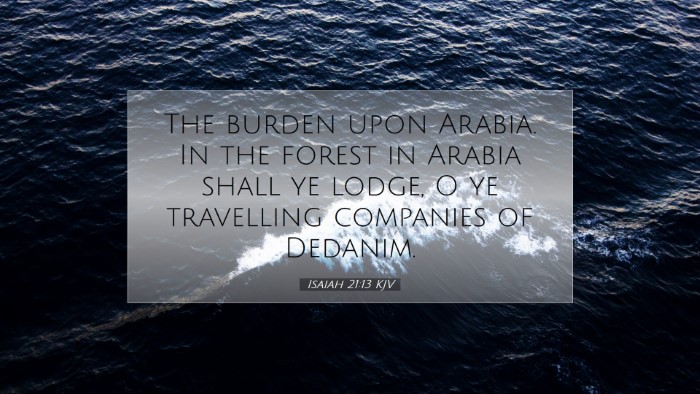Isaiah 21:13 Commentary
Isaiah 21:13 states: "The burden upon Arabia. In the forest in Arabia shall ye lodge, O ye travelling companies of Dedanim." This verse introduces a prophetic burden concerning Arabia, conveying both immediate and eschatological significance.
Contextual Overview
The book of Isaiah is a profound prophetic text that speaks to both Israel and the surrounding nations. The context of Isaiah 21 points towards impending judgments, calamities, and the fate of nations, including those in close proximity to Israel.
Historical Context
Arabia, historically favorable for trade and pastoral life, presents itself as a scene of desolation in the prophetic literature. The mention of Dedanim (or Dedan) refers to a group of people closely associated with trade and living in the desert regions of Arabia.
- Dedanites: They were known as traders, often traversing the sands to secure lucrative trade routes.
- Geographical Significance: Arabia's location served as a link between Africa, Asia, and Europe. Prophetic references here communicate not only immediate concerns but reflect the socio-political dynamics of the region as affected by larger empires.
Exegetical Insights
The "burden" mentioned indicates a pronounced weight of prophetic pronouncement carried by Isaiah. This reflects not only the divine decree but also the spiritual implications tied to the fate of peoples.
- Divine Judgment: The prophecy signifies impending judgment against those who defy divine authority.
- Migrant Nature: "In the forest in Arabia shall ye lodge" speaks to the transient state of the Dedanites, suggesting a time of displacement and vulnerability amidst impending turmoil.
Theological Reflections
Theological themes stand out in this verse:
- God's Sovereignty: The reference to a burden emphasizes that even foreign nations are under divine scrutiny, showcasing God's overarching governance of history.
- Sin and its Consequences: The burden symbolizes a warning against idolatry, sin, and complacency that ultimately lead to societal decay.
- Hope amidst Judgment: Even within the weight of prophetic judgment, there lies an opportunity for repentance and hope for restoration as illustrated throughout the Book of Isaiah.
Commentary from Notable Scholars
Matthew Henry
Henry notes that this verse serves to raise awareness of the surrounding nations' eventual downfall due to their own pursuits and lack of alignment with divine expectations. He emphasizes the inevitability of judgment—an essential theme in the prophetic works of Isaiah.
Albert Barnes
Barnes elaborates on the significance of Arabia in this passage. He argues that while Arabia was often viewed in a benign light, the prophet’s words indicate how even transient nations must acknowledge their place under God's authority. His perspective illuminates the moral imperative for nations to consider their conduct before God.
Adam Clarke
Clarke provides a critical interpretation of the metaphorical language employed in Isaiah. He highlights the desolate imagery as a reminder not only of physical displacement but as a representation of spiritual conditions; where God's presence is absent, desolation prevails. His views draw a clear connection between the moral state of a people and their physical circumstances.
Practical Applications
The message of Isaiah 21:13 has poignant implications for contemporary ministers, scholars, and those engaged in theological studies:
- Awareness of Cultural Context: It is vital to grasp how cultural and historical contexts influence understanding of prophetic texts.
- Call to Vigilance: Just as the Dedanites faced consequences for their actions, so too are modern believers called to examine their fidelity to God amidst prevailing cultural influences.
- Sovereign Awareness: Recognizing God’s sovereign authority in all matters encourages deeper trust and dependence on Him.
- Hope in Prophetic Realities: This text cautions against despair when facing difficult situations; prophecy holds not just judgments but pathways to restoration.
Conclusion
Isaiah 21:13 serves as a powerful reminder of God’s active role in the affairs of nations and individuals. The burdens placed upon Arabia and its wanderers communicate timeless truths about morality and the consequences of neglecting divine standards. As pastors, students, and theologians engage with this text, the call remains to seek alignment with God's will, embrace the message of repentance, and look with hope to the possibility of regeneration even in times of judgment.


